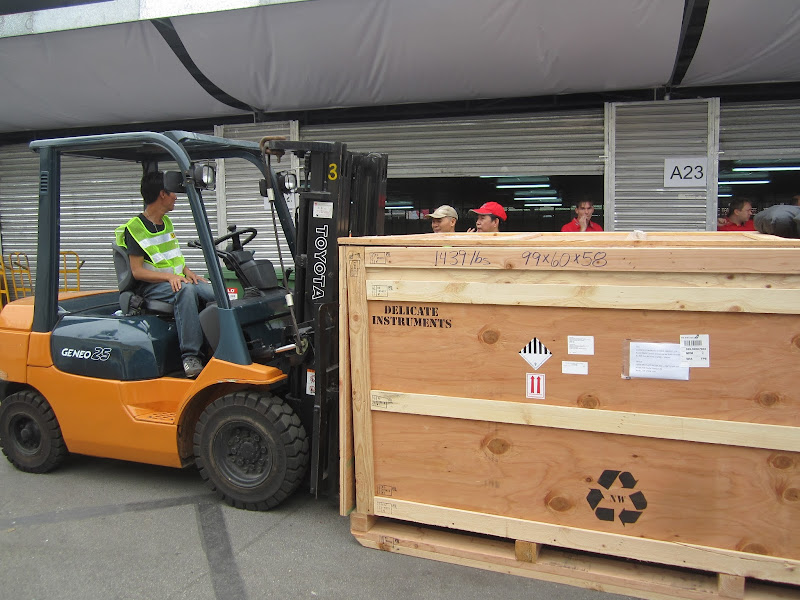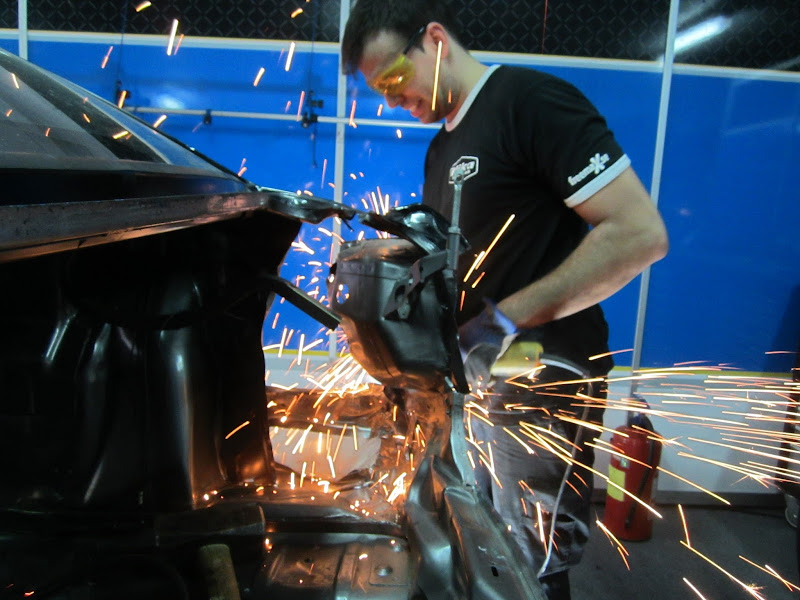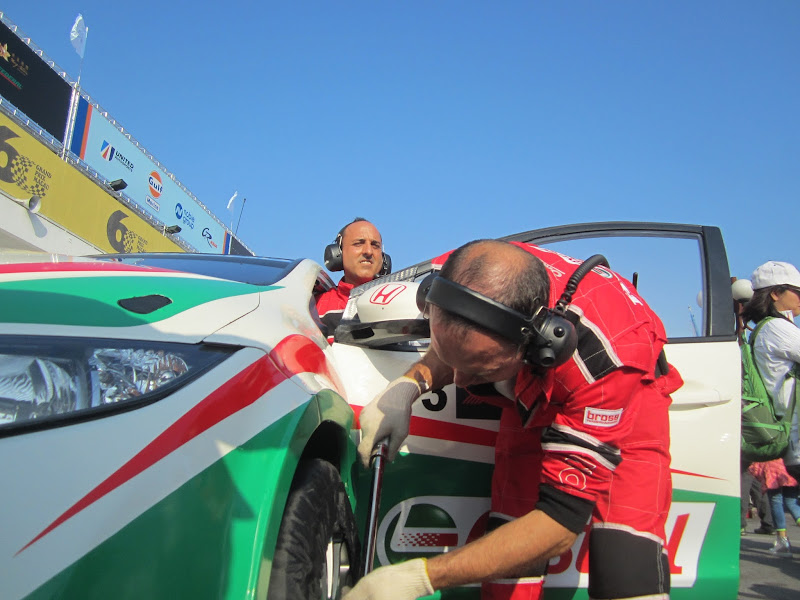 |
| ©Andy Buckley |
I have just found out that this old race car transporter sold at auction for
£1,793,500. WOW !!!!!!
That,s big money for a truck, even though it is a unique one. I am certain that the trucks that we drive today will not be worth this amount of money in 50 or 60 years time.
Anything to do with motorsport seems to have a value when it gets old whether it is an old racing car, a pair of drivers gloves, old team clothing, old team advertising and even the books that are written about the sport.
I appreciate all of you who take time to visit my blog and read about me and my work colleagues, and 50 or 60 years from now, I hope you will still be able to find it on the internet and read it FREE OF CHARGE
You can click on the link below and read the listing from the auction website..
http://www.bonhams.com/auctions/20934/lot/11/
And I have copied the written text for you below..........
Perhaps the motor racing World's best known and most instantly
recognized team transporter, the Ecurie Ecosse team's celebrated Commer
is offered here in fully-restored, running and fully 'road-prepared'
order – direct from its long-time owner, Mr Dick Skipworth and his
magnificent
Ecurie Ecosse Collection
The team had relied
upon a pair of venerable converted coach transporters through the 1950s
but once David Murray's D-Type Jaguars had not only won their second
consecutive Le Mans 24-Hour race in 1957, but had also come home first
and second in that latter year's Grand Prix d'Endurance, membership of
their
Ecurie Ecosse Association supporters club absolutely boomed.
Collectively,
Association members were keen to help the team's racing efforts. The
weakest link in the Merchiston Mews chain was plainly transportation, as
identified by Alastair Cormack, managing director of James Ross &
Sons Motors, Rootes Group agents. He had been a prominent racing driver
with Alta cars pre-war when he competed most notably at Brooklands and
Donington Park.
Another Association member was Ronnie Alexander,
managing director of Walter Alexander and Company of Falkirk, specialist
truck and bus coachbuilders, and he offered to have a one-off
transporter designed and built by his company. Further support for the
project was offered by British Aluminium (paneling), Dunlop, Joseph
Lucas and Wilmot Breeden. Machining and other services were also donated
by companies such as John Gibson & Sons, and so work began on the
team's brand-new transporter in 1959 with substantial funding provided
by the
Ecurie Ecosse Association.
Walter Alexander's
Design Manager, Selby Howgate, was himself a colourful character within
the Scottish motoring world. He had trained as an aerodynamicist within
the British aviation industry and was a tremendous Bentley enthusiast
who drove his particularly quick 4½-Litre model "with vigour". A genial,
good-humoured gentleman, Selby Howgate wore a luxuriant toothbrush
moustache and usually drove his thunderous Bentley swathed in heavy
tweeds.
Howgate's contemporary assistant at Walter Alexander's, Ian Johnston, would later recall that had this Commer transporter for
Ecurie Ecosse been
an actual commercial project it would have cost an absolute fortune.
This was because the ever-ebullient Design Manager kept changing his
mind but in the end what he created has been described as being
"...nothing short of stunning in concept and execution". Many people
have commented on the upward sweep at the rear of the bodywork which Ian
Johnston explains was the answer to Selby's rhetorical question, "What
is the most streamlined thing in nature....a fish."
The
transporter emerged with a spacious cab for the Commer's crew, plus a
six-foot by six-foot square workshop area behind, providing a work bench
and vice, and which also gave car-underside access on the upper deck.
One car could be accommodated on the 'bottom deck' and two 'up top'. A
single hydraulic ram located under the floor raised and lowered the
upper ramp via cables, absolutely as original.
This uniquely
well-specified Commer transporter was finished in time for the 1960
motor racing season and it made its public debut at the Scottish
Charterhall aerodrome circuit on May 29 1960.
Wherever it travelled
the Ecurie Ecosse transporter was admired and when the team was wound
down early in 1971 the ageing Commer was sold to the prominent historic
racing driver Neil Corner who actually owned – and still campaigned –
one of the ex-
Ecurie Ecosse D-Type Jaguars. The Commer's flanks
were re-signwritten to bear the legend 'Corner Racing' but retained the
distinctive original
Ecurie Ecosse style. Mr Corner still waxes
quite lyrical about the vehicle even today, over thirty years later. It
subsequently passed through many hands including those of Historic
racing specialist Tony Merrick and Roger Ludgate but as the years passed
so it had deteriorated in the way that well-used, obsolescent
commercial vehicles so frequently do. Various tales are attached to the
old vehicle, including one that it failed to find a buyer when offered
for just £15, and another that since it was still a runner it was used
occasionally to transport beer barrels and animal feed...
Meanwhile, Dick Skipworth had just acquired the
Ecurie Ecosse
C-Type Jaguar 'KSF 182' from Campbell MacLaren. The car was being
prepared for him by Chris Keith-Lucas, then of the Jaguar specialist
Lynx company, and "over a coffee mentioned to him that carting the
C-Type around on an open trailer isn't quite the thing, is it? What I'd
really like is something a little more in keeping...".
Mr Keith-Lucas instantly exclaimed: "I think I know where there's just the thing. But it needs a bit of work!".
Didn't
it just. But Mr Skipworth's acquisition of 'VSG 7' now offered here and
its subsequent virtually single-handed restoration at Lynx by the late
John Hay is one of the great Historic motor racing rescue sagas of all
time. During restoration the opportunity was taken to provide sleeping
accommodation for the crew behind the cab, while great care was taken to
retain virtually all the original superstructure's aluminium skinning.
Indeed, as has often been pointed out, the Skipworth/Keith-Lucas
intervention probably came just in time to save this iconic vehicle.
Alexander's original brief in 1959-60 had been to provide for
Ecurie Ecosse
a transporter vehicle no more than 30 feet long, yet capable of
carrying three contemporary-sized sports-racing cars while also
incorporating a workshop space. Selby Howgate selected a Commer
TS3-powered bus chassis from the Rootes Group as his starting point, and
indeed the vehicle's supremely sophisticated contemporary design
provided something of a coachbuilder's dream. Since Commer's
revolutionary three-cylinder, opposed-piston compressor-scavenged diesel
engine is so compact, it could be housed completely between the chassis
side members, thus providing a totally flat platform upon which the
transporter bodywork and fittings could be erected.
The
renowned TS3 engine was the first diesel unit to be adopted by the
Rootes Group and had been created largely by Tilling-Stevens engineers
before that company's acquisition by Rootes. The 'TS' initials are those
of Tilling-Stevens, who manufactured the unorthodox power unit in their
factory in Maidstone, Kent. The unit was unusual not only in being a
two-stroke, compression-ignition diesel unit comprising only three
uniflow-ported horizontal cylinders, each housing two pistons moving in
opposition to one another. Even more unusually, since most
opposed-piston engines feature a separate crankshaft at each end of the
cylinder, in the TS3 both sets of pistons drove the same single
crankshaft housed beneath the cylinders, each piston driving it via a
connecting rod, rocker lever and a second connecting rod.
Burned-charge
scavenging was performed by Roots-type 'supercharger' that was mounted
on the front of the engine, driven by a long quill-shaft from chain
drive at the rear of the unit. Cylinder displacement was 3.2-litres and
power output was a quoted 105bhp at 2,400rpm, allied to 270lbs/ft torque
at just 1,200rpm.
It has been written that: "The new
Ecurie Ecosse vehicle
was without doubt the most memorable of all the transporters from that
era, eye-catching in the extreme with its long, rakish lines and
forward-sloping windscreen to allow the upper ramps to run the full
length of the vehicle. Finished in the usual Ault & Wiborg 'Flag
Metallic Blue' with smart gold signwriting either side, it turned heads
wherever it went, its unique exhaust note giving advanced warning of its
approach...".
Into 2013 the
Ecurie Ecosse transporter is
just as resplendent as it ever was thanks to Mr Skipworth having
commissioned its extensive restoration. He has used it for many years
now to carry as many as three of his ex-
Ecurie Ecosse cars. At
the 2007 Scottish Classic race meeting at Knockhill Mr Skipworth arrived
with the ex-Ecosse Austin-Healey Sprite, D-Type Jaguar and the
Tojeiro-Jaguar on 'VSG 7'. On the Saturday there, Ian Johnston – the
Walter Alexander veteran - came to see the transporter and the following
day brought with him Adam Burrell, then in his eighties, who had built
the vehicle's aluminium body back in 1959-60. Hugh McCaig, the present
patron of
Ecurie Ecosse, was thrilled that Mr Burrell had been
able to attend, while he in turn was emotional about seeing his creation
for the first time in fifty years.
The vehicle operates on an
historic licence (incurring zero UK tax). It is rated at 11.5 tons and
annnually passes the stringent UK VOSA test for commercial vehicles. It
will cruise all day long at a comfortable 55mph, returning average fuel
consumption of 18 miles per gallon.
In considering this unique
racing car transporter's many attributes, its distinctive design has
been celebrated over many decades now before a far wider audience since
it served as the full-size prototype for a scale-model depiction
produced by the Lines Brothers Corgi Toy brand. As recently as this past
autumn a Corgi
Ecurie Ecosse No 16 transporter and gift set,
described as boxed and mint, featuring 'VSG 7' as its centerpiece was
offered on eBay for a 'Buy it Now' price of £760...
Today, 54 years since it was first commissioned, the real 1:1-scale
Ecurie Ecosse Commer
transporter 'VSG 7' offered here survives as an immensely practicable
and highly-useable Historic racing car transporter, and as a
much-in-demand and utterly unmistakable adornment for any promoter's
Historic event paddock. This is a supremely important 1950s/60s racing
car transporter. Unlike the almost-as-distinctive Fiat-Bartolettis made
famous by Ferrari, Maserati and Reventlow Scarab/Shelby Cobra – 'VSG 7'
presented here has no siblings – it really is unique.... And simply
gorgeous.









.JPG)







.JPG)

.JPG)








































